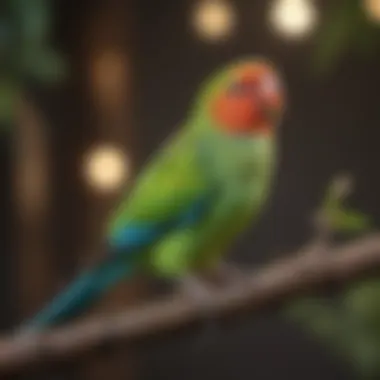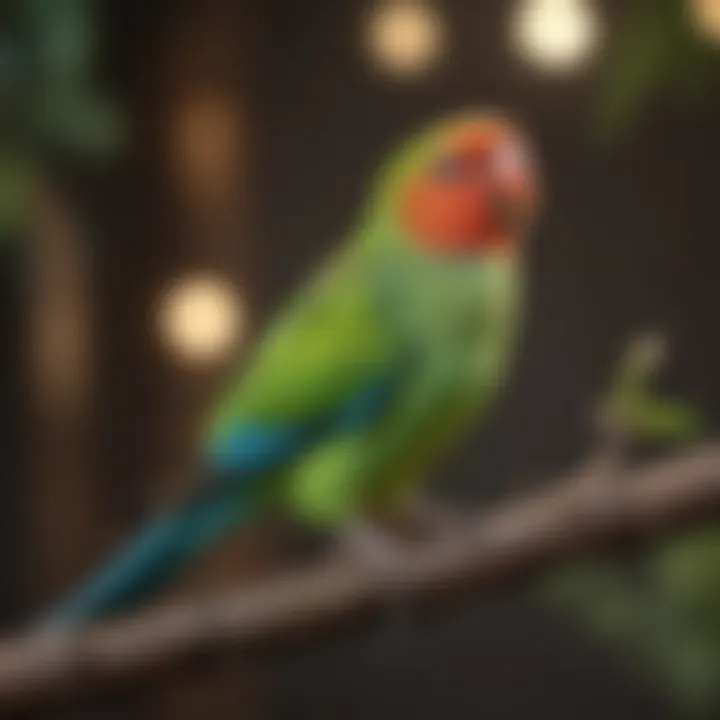Exploring Pet Bird Names in Hindi: A Comprehensive Guide


Intro
Naming a pet bird is more than just a playful gesture; it’s a vital part of developing the bond between the bird and its caregiver. As bird enthusiasts may know, the choice of name carries with it cultural weight and personal significance, especially when exploring pet bird names in Hindi. From chidiya for small birds to kauwa for crows, there’s a whole world of names that can echo the beautiful nuances of the avian life we appreciate.
In this guide, we will embark on an insightful journey through the world of Hindi bird names. We’ll delve into rich cultural traditions, assess modern naming trends, and present valuable tips for those who are about to welcome feathered companions into their homes. Whether you’re a seasoned bird owner or a newcomer to aviculture, selecting the perfect name can enhance the experience with your pet and signify a deeper connection to your avian friend.
Throughout this exploration, we will also touch upon relevant aspects of avian care. Understanding your bird’s needs does not only include nutrition and habitat management but also extends to the essence of interaction and emotional well-being. Just like a well-chosen name, caring for a bird involves nuances that speak to the importance of recognizing its individuality and character.
Let us begin our expedition with the basics of bird care, laying a solid foundation that will ultimately enrich your understanding of both the responsibilities and joys of avian companionship.
Understanding Cultural Context
For anyone aiming to find the right name for a pet bird in Hindi, diving into the cultural context is indispensable. The names we choose are not just mere labels; they embody stories, heritage, and the rich tapestry of emotions tied to our feathered companions. Understanding the cultural context offers a treasure trove of insights that can aid in selecting names that resonate deeply, capturing the essence of the bird and the bond shared with its caregiver.
The importance of cultural context can be seen in several pillars:
- Reflection of Heritage: Names often reflect the values, customs, and traditions of a culture. By understanding these roots, one can select names that have a meaningful connection, whether to family or locality.
- Cultural Sensitivity: In today's diverse world, being aware of cultural connotation is crucial. Some names may carry weight or symbolism that inspire or offend. A bit of foresight goes a long way in ensuring harmony when naming your pet.
- Language and Emotion: Language itself is a powerful tool. The way names sound can influence the emotional response they evoke. Certain sounds and syllables may be more endearing, which adds another layer to the naming process.
In essence, recognizing the cultural context not only enriches the naming experience but also establishes a deeper connection between the bird and its owner.
Historical Significance of Birds in Hindi Culture
Birds have long held a special place in Hindi culture, woven into the folklore and art of the region. They are often seen as symbols of freedom, beauty, and nature's delight. Historical texts and traditional stories reference birds, showcasing their significance in the lives of people.
From the harsh but beautiful reality of life as depicted in ancient texts to the more whimsical and imaginative tales where birds are heroes, they are portrayed across varying narratives.
For example:
- Saraswati, the goddess of wisdom, is often depicted riding a swan, linking birds with knowledge and spiritual enlightenment.
- Cuckoos and nightingales feature prominently in poetry, where their song signifies love and longing.
Thus, naming a pet bird after these cultural figures or symbols can not only honor tradition but also imbue the bird's name with a sense of lineage and dignity.
The Role of Language in Naming
Language plays a significant role in forming names, particularly in how they sound and what they mean. Especially in Hindi, names can derive from various roots and can reflect various traits or characteristics.
The dynamics of naming include:
- Phonetics: Certain sounds in Hindi evoke specific feelings. For example, softer sounds like "मीत (Meet)" can suggest friendliness and affection.
- Meaning: Names often carry meanings that can reflect the owner's wishes or aspirations for their birds. A name like "चिराग (Chirag)" meaning light can signify brightness in one’s life.
- Cultural References: Some names might reference folklore or historical figures relevant to birds, enriching the name's depth.
The choice of name thus becomes a multi-faceted decision, resonating with emotional, cultural, and linguistic significance. It can also shape how others perceive the bird, infusing it with a personality that aligns with its distinctive characteristics.
Popular Pet Bird Names in Hindi
Birds often bring joy, companionship, and a certain charm into our lives. When it comes to naming these feathered friends, the options can be as varied as the birds themselves. Popular pet bird names in Hindi not only reflect the beauty of the language but also the tender essence of the relationship between the bird and its caregiver. Choosing the right name is more than just a label; it’s about connection, respect, and understanding. Here, we dive into the categories of these names, discussing their significance and the emotion they encapsulate.
Common Names and Their Meanings
Names in Hindi often carry weighty meanings, and this is particularly true for common pet bird names. For example, Moti means pearl, indicating a beloved pet's preciousness to its owner. Another widely used name is Chintu, which is often used affectionately for small birds, implying warmth and fondness. Names like Pihu connect with songs, giving a sense of musicality and joy similar to the chirps of birds.
These names resonate in everyday conversations, and their meanings can bridge the gap between humans and avians. When pet owners opt for names loaded with meaning, it enhances the bond they share. Many people choose names based on their pet's physical appearance or personality traits. For instance, a particularly vibrant bird might be called Rangila, which translates to colorful—a perfect match!
Names Inspired by Nature
Nature offers a treasure trove of inspiration when it comes to naming birds. In the vibrant lexicon of Hindi, you will find names drawn from elements of the natural world. Consider Neelkanth, a term for the blue kingfisher. This name not only reflects the color but reflects grace and beauty associated with the bird itself. On a different note, names like Gulab, meaning rose, infuse the naming process with floral imagery, perfect for a bird that’s as delicate as the flower.
You might also encounter names like Pavan, which means breeze. Such names evoke a sense of freedom and the lightness of being, reminding one of the effortless flight of birds in the sky. Additionally, names like Badal, meaning cloud, connects diverse birds with the vast expanse of skies they navigate daily. These names bring a piece of nature into one’s home, deepening the relationship with one's feathered companion.
Names with Mythological Roots


In the rich tapestry of Indian mythology, birds often symbolize various traits, and naming them after these stories can provide a deeper connection. Names like Garuda, the mythical bird, symbolize strength and loyalty; they carry a historical weight that echoes through the tales of generosity and courage. Another name found in stories is Koyal, referring to the cuckoo bird, which is often associated with longing and romance in literature.
Moreover, you might hear names like Huns, the Sanskrit word for swan, which embodies purity and elegance. Naming birds after mythological figures or elements helps to infuse a bit of storytelling into everyday life. The mythology lends a touch of sophistication, making the bird not just an animal but a character in the embrace of life’s narratives.
"Choosing a name steeped in meaning connects us not only to our pets but to the world surrounding us."
Whether flocking to names inspired by the natural world or those rooted in cultural mythology, the act of naming remains a joyful and intentionally cultivated process. It’s an opportunity to reflect on personal values, beliefs, and even the lore surrounding these enchanting creatures. By diving into the popular names used for pet birds in Hindi, owners can create lasting relationships with their feathered companions, creating an affectionate household full of stories.
Choosing the Right Name for Your Bird
Choosing the right name for your bird is more than just a playful addition to its identity; it serves as a vital part of the bond that you build with your feathered friend. Names carry weight and can reflect not only the qualities of the bird but also the personality traits and character of the owner. This segment dives into the various elements to ponder over when picking a name, highlighting its influence on both the bird and the owner. A well-chosen name can enrich the experience of bird ownership, fostering connection and companionship.
Factors to Consider in Naming
When sifting through potential names for your bird, several factors come into play.
- Sound and Length: Birds respond well to short, sharp sounds. Names with one or two syllables often grab their attention better than longer ones. A name like "Motu" might catch their ear more effectively than something more cumbersome.
- Cultural Significance: Names can hold significance in Hindi, stemming from cultural backgrounds or family traditions. Perhaps your family has a pet bird named "Chikku" after a beloved relative; it carries historical weight.
- Personal Preferences: Your own tastes and preferences should also shape your decision. If you lean towards nature-inspired names, something like "Phool" (flower) could fit right in.
- Future Scenarios: Think about the future. Will the name still suit your bird as it grows, or do you suspect it may earn a rather different character as it matures?
By examining these factors, you'll make a more informed decision that can lead to a lasting bond.
Reflecting Your Bird's Personality
Your bird’s name should also be a reflection of its character. Is it sprightly and full of energy, or calmer and more contemplative? Observing your bird’s behavior can provide clues for the perfect name. For instance, if your parakeet is chatty and sociable, a name like "Bholu" could suit it well, as it evokes a sense of joy. Conversely, a shy or quiet bird may feel more comfortable with something understated like "Moti,” meaning pearl, known for being simple yet precious.
Another essence to ponder is the bird's appearance. If it has vibrant plumage, a colorful name like "Rangila" could capture its essence nicely. Try spending some time with your bird, watching its antics and mannerisms; inspiration often comes in unexpected moments.
The Impact of Name on Behavior
Surprisingly enough, the name you select for your bird can also influence its behavior. Birds are known to respond to the sound of their names, creating a foundation for communication that can affect their happiness and willingness to interact. Think about how you might feel if called something you didn't resonate with.
"A name can influence a bird’s behavior, shaping the bond between owner and pet."
Moreover, names can emotionally charge interactions. For instance, a name that carries affection, such as "Chutki" (little one), can foster a nurturing bond, making your bird feel loved and secure. Conversely, a name with sharp sounds might invoke a more cautious or alert demeanor. Understanding how your bird reacts to its name can enhance your relationship.
In summary, choosing the right name encompasses a range of considerations, from personal connections to personality reflections, underpinned by a grasp of the potential influence that name can exert on your feathered companion's behavior. The time spent in this decision-making process can only serve to deepen the connection between you and your bird.
Regional Variations in Bird Names
Understanding regional variations in bird names is essential for pet bird owners in India. Each region carries its own unique linguistic flair, cultural nuances, and influences that shape how people name their feathered friends. The diverse landscape of India means that names can have distinct meanings and sounds depending on where you are.
This section aims to explore how regional dialects and local traditions impact pet bird naming conventions, offering insight into the beauty and complexity of Hindi language and culture.
North Indian Names
North India, with its rich tapestry of cultures, presents a cornucopia of bird names that reflect local traditions and idioms. For instance, names like "Mithu" for parrots or "Koyal" for cuckoos are commonly used, invoking images associated with joy and melodious sounds.
It’s interesting to note how certain names can evoke specific characteristics. Names may often be designed to reflect the bird’s physical traits or behavioral quirks. For instance:
- Choti (little) is often given to smaller birds, emphasizing their daintiness.
- Raja (king) could be assigned to a grand and vibrant macaw, showcasing its regal appearance.
It’s more than just a name; it’s a reflection of your bird’s personality and charm.
Families may choose names based on connection to folklore or local stories; this provides a deeper significance than merely aesthetic appeal. The use of idiomatic expressions or phrases in naming adds an element of familiarity and warmth.
South Indian Influences
Moving towards South India, the landscape enriches the naming conventions even more. The culture heavily relies on local languages such as Tamil, Telugu, or Kannada, offering a variety of unique names, each carrying its own flavor. For example:
- Kili in Tamil means parrot, and it’s a popular name for birds here.
- Chintu refers to something small and is often used affectionately for smaller birds.


These names often reflect cultural references or traditional practices, maintaining a link with heritage. Moreover, it’s common for people in South India to use names that reference local flora and fauna. A name like Malli translates to jasmine, often symbolizing beauty and grace, making it a popular choice for aesthetically pleasing birds.
Names in this region can also showcase a blend of modern and traditional influences, reflecting the dynamic nature of contemporary societies.
Names from Eastern India
East India brings its own set of naming conventions that often borrow from the charm of local dialects and folklore. Names like Shukra, which means sparrow, resonate with both simplicity and cultural depth. Here, pet birds’ names often connect to their surroundings and local customs.
Bird enthusiasts might consider names like:
- Pakhi, which means bird in Bengali, symbolizing freedom and grace.
- Golapi, often used for pink-colored birds, denoting aesthetic beauty.
Eastern influences often celebrate the lyrical beauty of their languages. Furthermore, people may choose names that echo cultural deities or historical figures, creating a strong bond between the owner and the bird. It showcases a mix of reverence and affection, adding layers to the act of naming.
In summary, regional variations in bird names not only enrich the pet owner’s experience but also highlight the cultural heritage and linguistic diversity of India. Each name carries stories and connections, making them more than just labels but representations of one's culture and personal identity.
Modern Trends in Naming Pet Birds
Naming pet birds has evolved over the years, showing how our interactions with these feathered companions are influenced by the changing society around us. Today, pet bird names aren't just whimsical choices—they reflect personal beliefs, cultural affinities, and even contemporary phenomena. For pet bird owners, grasping these modern naming trends can enhance their connection with their birds and bring a layer of understanding about their choices and preferences.
Influence of Pop Culture
Pop culture plays a vital role in shaping naming conventions. With the prevalence of social media, television shows, and the latest blockbuster films, names that resonate with current popular trends have found their way into the avian naming sphere. For example, names drawn from beloved characters in shows like "Game of Thrones" or movies such as "Frozen" have surged in popularity among bird enthusiasts. Some of these distinctive names include, but are not limited to, characters like "Arya" or "Elsa."
The impact of pop culture can also be observed through the influence of celebrity pets. When a famous actor or musician showcases their pet birds, they often inadvertently inspire others to adopt similar names. It reflects a sense of connection and shared experience, even if indirectly. Thus, pet bird owners often find themselves selecting trendy names they associate with their interests.
Creative Combinations and Fusion Names
In today’s fast-paced world, there’s a growing trend of using creative combinations when naming birds. This practice draws from various influences—cultural, stylistic, and even linguistic. By fusing names or elements of different names, owners create something unique and personal. For instance, something like "Sunnybird" can emerge, combining an uplifting emotion with a straightforward descriptor.
Fusion names often embody relevant traits or characteristics of the bird itself, allowing for a flash of individuality. These names might draw on the bird's colors, sounds, or even its habitat. A vibrant parrot could be dubbed "Flamefeather," merging the image of fire with the essence of a bird's plumage.
This innovative approach not just resulting in distinctive names, but it also showcases the owner’s creativity.
"Naming your bird isn't just about choosing sounds; it’s about defining a character and a bond. Each name tells a story."
Moreover, combining elements from different languages or cultures can introduce an added charm. It can reflect the owner’s heritage or just be a word that resonates. For example, merging Hindi with English, you might find creative choices like "Green Chidiya" or "Blue Bahar," enriching the cultural depth of the name.
The trends underscore how naming is more than a label; it's an expression of the bond, diversity, and the shared moments we create with our pet birds.
The Bond Between Name and Identity
Naming a pet bird goes beyond simply choosing a sound or word; it creates a crucial link between the bird and its owner, establishing identity and significance in the relationship. The name serves as a bridge that fosters communication and understanding. When a bird responds to its name, it reflects an acknowledgment of its place within its human’s world. This connection enhances the bond, fostering trust and affection, which are invaluable elements in the pet-owner dynamic.
The importance of names lies not only in their role as identifiers but also in their ability to encapsulate the individual personality traits of the bird. For instance, a spirited parakeet might be aptly named “Chirpy,” while a calm and serene cockatiel may suit the name “Mellow.” Each name carries a load of expectation and meaning. Caregivers often feel an impulse to reflect their love, hopes, or aspirations through the names they pick. This can be especially true in Hindi, where names can embody profound cultural narratives.
How Names Shape Relationships
Names have a way of shaping relationships in subtle yet significant ways. Just as a name can signify identity, it can also influence how the owner perceives and interacts with the bird. The act of calling a name repeatedly can cultivate recognition, making the bird feel included and secure. Recognition leads to a feeling of safety, critical in developing a healthy relationship.
Moreover, these names can facilitate deeper emotional bonds. Birds can pick up on tone and inflection. For example, calling your parrot “Golu” in a loving or excited tone may foster positive reactions, strengthening its association with that sound. This interaction is not merely linguistic but emotional. The more a name is used in a positive context, the more it shapes the dynamics of the relationship between the bird and its owner.
Affectionate Nicknames and Their Usage
Affectionate nicknames introduce another layer of intimacy to the bond shared between pet and owner. These nicknames often emerge organically, reflecting personal moments or quirks of the bird. For instance, if your budgie has a penchant for perching on your shoulder, calling it “Shoulder Buddy” can enrich your bond, as the name evokes shared experiences.
Using affectionate nicknames can also make the environment feel more inviting. They often serve as a reminder of care, love, and companionship. The nuanced interactions that come with playful naming can, surprisingly, encourage positive behaviors in birds. They might feel more at ease or even engage more when they hear those charming alternatives to their original name.
"A name is not just a word; it’s the beginning of a story that can shape lives and relationships."


Through careful thought and a touch of creativity, pet owners can choose names that echo these sentiments, ensuring their bird feels deeply connected to their new home.
Practical Tips for Naming Your Bird
Choosing a name for your feathered friend is more than just a whim; it's about forging a connection that communicates your affection and understanding of their unique personality. Names possess an inherent power, they can influence not just how we perceive our pet, but also how they perceive us. That’s why the naming process should not be taken lightly. Here are some practical tips to guide you toward making that all-important decision.
Involving Family in the Naming Process
When it comes to picking a name, involving family members can enhance the experience. This way, you ensure the name resonates with everyone in the home, creating a shared bond over your new avian companion. It can be a fun family activity, turning the task into a small event.
- Host a Naming Day: Set aside an afternoon, gather your family, and brainstorm together. Write down every suggestion, no matter how silly it may seem at first. Kids often have a flair for creativity that might surprise you!
- Vote on Names: After generating a list, you could host a vote. This democratic approach can make everyone feel included and invested in the choice.
- Exploring Cultural Roots: Since the focus here is on Hindi names, share stories about some of the names you’re considering. Knowledge about their meanings may spark deeper interest and result in a name that carries sentiment.
"A name is not just a label, it’s a preview of the relationship you share with your pet."
Testing the Name with Your Bird
Once you’ve narrowed down your options, it’s time for an essential step: testing the name with your bird. Birds can be quite perceptive and may respond differently to various sounds and syllables.
- Observe Reactions: Call out the names you've shortlisted and see how your bird reacts. Do their ears perk up? Do they seem to approach you? A name that sparks curiosity or engagement can be more suitable.
- Repeated Use: Integrate the name into daily interactions. Use it while feeding, playing, or even during quiet moments. Your bird’s comfort with the name can indicate whether it’s a good fit.
- Be Patient: Sometimes, birds take their time to warm up to a new name. Give it a few days before making your final call.
In summary, naming your pet bird is part of a rich process that involves family and your pet’s own personality. Take your time, enjoy the process, and let the name be a reflection of the unique bond you share.
Case Studies: Real-Life Bird Names
Exploring the world of pet bird names reveals more than just labels; it offers a glimpse into the lives of the bird owners themselves. Real-life case studies shed light on the unique stories behind the names people choose for their feathered friends. This section illustrates how names often reflect not only individual personalities but also cultural ties and personal experiences. The significance lies in the emotional connection established through these names, enriching the bond between bird and owner. This exploration can serve as inspiration for others searching for that perfect name while highlighting the creativity and thoughtfulness involved in the naming process.
Stories behind Unique Names
Bird owners often opt for names that carry personal stories or meanings. Take, for instance, a parakeet named Chirpy. This name might seem simple at first glance; however, it stems from the owner's cherished memories of childhood, where the sound of chirping birds filled their home. Chirpy's lively noises echo those earlier days, establishing deeper ties between the bird and the memories shared.
Another example is a cockatiel named Raja, chosen as a nod to the owner's love for historical figures. The name, which means "king" in Hindi, reflects the bird's regal demeanor, living up to its royal title in its mannerisms and behaviors. The owner's passion for Indian history infused the naming choice, turning the bird into a symbol of honor.
"A name captures a moment, an idea, or even a dream that we project onto our pets. It’s a wonderful blend of affection and identity."
Additionally, consider the case of a lovebird named Bubbly. The owner describes this name as an embodiment of the bird's cheerful spirit, projecting an aura of joy wherever it flies. Such choices reveal how names can encapsulate not just appearances but also the intrinsic qualities that define a bird.
Analyzing Popular Choices
A look at popular names across cultures shows distinct trends influenced by societal preferences and personal inclinations. Many owners tend to gravitate towards nature-inspired names, like Gulab (rose) or Neel (blue), which tend to resonate deeply, imbuing their pets with an immediate connection to the environment. These choices evoke imagery of colors and elements, making the name feel more integrated into the world outside the cage.
Conversely, some owners prefer whimsical or playful names, such as Twinkle or Pip, which evoke a sense of lightheartedness. These names often signify the playful interactions that owners wish to cultivate with their birds. It's fascinating how certain names bubble to the surface, often mirroring the popular culture of the moment.
For example, names like Mithu, often referring to a generic term for a parrot, enjoy evergreen popularity due to their deep-rooted connection in Hindi culture.
In summary, case studies around real-life bird names provide a treasure trove of insights into the relationship dynamics between birds and their owners. Understanding these narratives fosters an appreciation for the rich tapestry of names that celebrate not just avian companions but also the humans from whom they receive their titles.
Epilogue: The Impact of a Name
Naming a pet bird goes beyond simply assigning a sound to a creature; it creates a bond and reflects the pet owner's affection, values, and intentions. The name you choose can shape not only the identity of your avian companion but also the relationship you nurture together. A thoughtful name can evoke a sense of belonging for the bird, signaling its unique place in your life.
It's crucial to remember that names can influence behavior. For example, research illustrates how pets respond to names that carry positive connotations, potentially encouraging more amicable interactions. When a bird has a name that resonates with its personality or characteristics, it might act in ways that harmonize with its designated identity. Imagine calling your parakeet "Chirpy" and watching as it produces joyful sounds, innately responding to its title.
Moreover, the cultural context surrounding names plays a significant role. In Hindi culture, names often carry profound meanings that reflect attributes admired in birds, such as grace, vibrancy, or bravery. These cultural layers enrich the act of naming, making it a venture filled with heritage and significance.
To underline the importance of this topic, here are a few critical elements to consider:
- Emotional Connection: A name fosters emotional ties; a name laden with sentimental value a bird can deepen affection.
- Personality Reflection: Analytical insights suggest that names reflecting characteristics of the bird could harmoniously influence its behavior.
- Cultural Significance: The breadth of meanings behind Hindi names enriches both the owner's and the bird's experience.
"A name isn’t just letters strung together; it’s a word woven with love, character, and the essence of life shared."
Recap of Key Insights
To encapsulate the discussions throughout the article, it’s essential to revisit the core insights:
- Understanding the cultural backdrop can profoundly shape the naming process. Historical significance plays a key role in the depth of choice.
- Diverse names, from natural to mythological, offer a rich tapestry of options for pet owners to explore.
- There are modern, creative trends in naming that can reflect changing societal norms and influences, yet they can seamlessly integrate traditional elements.
- The relationship between a name and a bird's identity cannot be underestimated; both impact each other in intricate ways.
Thus, as prospective bird parents contemplate a suitable name, they are not just making a choice but embarking on a journey to create a lifelong bond beside their cherished companions.















